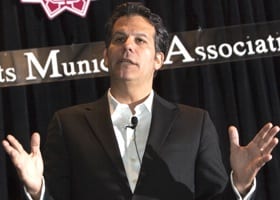Who is a member?
Our members are the local governments of Massachusetts and their elected and appointed leadership.
 Richard Florida, an author and planning consultant best known for his concept of the “creative class,” emphasized the economic importance of vibrant cities and towns during his keynote address at the MMA Annual Meeting on Jan. 22.
Richard Florida, an author and planning consultant best known for his concept of the “creative class,” emphasized the economic importance of vibrant cities and towns during his keynote address at the MMA Annual Meeting on Jan. 22.
“Communities have become as important as factories were in the industrial era,” said Florida, discussing the transformation of the economic landscape over the past three decades. “Our cities, our towns, are the center of economic growth.”
Economic competitiveness, he asserted, is dependent on a community’s ability to attract and retain creative people, ranging from artists and musicians to scientists and software designers. A concentration of such individuals, he said, can serve as an economic stimulus.
“For the first time in human history,” Florida said, “land, labor and capital are no longer the engines that drive human prosperity. That new economic driver is us – it’s our people.”
In Massachusetts, 1.2 million workers can be classified as part of the creative economy, he said. These workers account for 37 percent of the workforce, the highest percentage of any state.
“But 37 percent is not good enough,” Florida said. “It’s not enough to attract new workers to the creative class, or import more workers. … “Upgrading those service jobs in the economy, and making them more creative, is one of the things we have to do now.”
In recent years, Florida noted, much has been made of the notion that the Internet and other technologies have collapsed distances and made it easy for corporations to move their operations to places where labor is cheaper. New York Times columnist Thomas Friedman helped popularize this idea in his 2005 book “The World Is Flat.”
“People tend to think that ‘place’ doesn’t matter anymore,” Florida said. “But here’s the counterintuitive fact: Nearly half the earth’s population lives in metropolitan areas. We are becoming not only flatter, but we’re also becoming more concentrated. … It’s ‘place’ that is the driving force in our economy.”
Florida cited opinion-poll research that underscores the importance of a community’s amenities to the overall happiness of its residents. Across different income groups, he said, people value access to well-maintained parks, playgrounds and other public venues.
Also ranking high, according to the research, is an open-minded and inclusive community. Gays and lesbians, according to Florida’s research, are often a significant component where the “creative economy” has taken hold. He also noted that in Silicon Valley and other technology hotspots, foreign-born workers account for a prominent percentage of the talent pool.
Florida concluded with an anecdote about Microsoft co-founder Paul Allen. Some years, ago, Allen sought to create something that would give his home city an economic boost. Rather than build an office complex or technology center, Allen decided to finance a museum devoted to Seattle’s most famous musician.
“It wasn’t the scientists who were Allen’s role model,” Florida said. “The person who motivated him was the young guitar player who died, tragically, at age 27. … [In the field of music,] Jimi Hendrix was a technological innovator.”
The museum has proven to be a draw for tourism and economic activity.